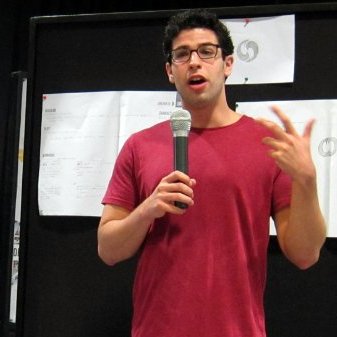Hi everyone, Amma Marfo here. Two quick things about me that you’ll need to know before we begin:(1) I am a reader. I am a library-loving, constant tome-carrying, unapologetic bibliophile. (2) If there’s anyone you will meet who can connect what she’s reading to the world around her, it’s me. As such, I want to dedicate my time in this space to sharing with you what I’m reading, and how it could inform a budding professional’s daily life.
I've got a fresh lesson for you all, one that I'm still living parts of...and what better time to share?
Lionel Shriver's We Need to Talk About Kevin is a captivating account (and I do mean that, as I started it on a free Sunday and didn't get up until I finished) of a mother's struggle to come to terms with her son's part in a school shooting and time in prison. This seems like an odd place from which to draw inspiration, but there was one lesson that stuck with me early in the book, and nagged away at me as I continued to read. I'm of the belief that those are the tidbits that are most worthy of our attention, so I came back to it and seriously considered why.
We Need to Talk About Kevin covers the span of mother Eva Khatchadourian's life that precedes children- through her marriage to her husband Franklin, their decision to have children, her pregnancy, and all through Kevin's life. It includes a key point when Kevin is about four years old, and is proving to be a difficult child. Up until this point, Eva feels that she has been distant from her son, that he simply doesn't like her. But she also recognizes that to this point, she was only partially committed to the role of parent. After escaping from a conflicted existence under the guise of a work trip, Eva vows to change her mindset, and hopefully her relationship with her son:
That sweaty, protracted delay allowed me to contemplate that so far my commitment to motherhood had been toe-in-the-water. In a funny way, I resolved. I had to remake that arduous decision of 1982 and jump into parenthood with both feet. I had to get pregnant with Kevin all over again. Like his birth, raising our son could be a transporting experience, but only if I stopped fighting it. As I was at pains to teach Kevin for years thereafter (to little effect), rarely is the object of your attention innately dull or compelling. Nothing is interesting if you are not interested. In vain, I had been waiting for Kevin to prove out, to demonstrate as I stood arms folded that he was worthy of my ardor [...] Flying into Kennedy, I was bursting with determination, ardor, and goodwill.
In the interest of greater disclosure, I have been at this point in a few different capacities over the past several months. Paths that I was hoping to travel down (like graduate school or new professional opportunities) haven't panned out as I had hoped, and I have had to recommit myself to current pursuits. Eva's call to reframe the current state of affairs as interesting has been important, and her call to stop fighting it has been even more important. I had the opportunity to hear Jason Segel (How I Met Your Mother, The Muppets) speak a few months ago, and he made a similar statement: "Most of our stress and anxiety comes from resisting the current state of things. You're fine."
We all have moments where we want something different. The belief that we deserve better. The expectation that we should be somewhere else, doing something else. But what do you do if that's just where you are? Lots of literature on creativity and inspiration would have you quit. And yes, that's an option. However, for any number of reasons, that's not realistic for everyone. What to do then?
Take stock of the current situation. This inventory should go both ways, by the way. The brain is conditioned to hold on to the negative, disappointing, scary parts of situations tenfold over the good things. As such, you'll need to take your time with this. I like to do this on paper, I feel more ownership over what I write that way. What frustrates you? What saddens you? What do you wish would change? Capture those things. What gets you through it? What parts do you like? Who surrounds you that helps you get through it all? Capture those things too. Both sides need to be represented. Don't be afraid to be real here- it's your life, you should consider it all.
Focus on the challenges- then break them down. I am giving you permission, for the duration of this process, focus on the bad. But I'm doing so for a reason. Of the things you wrote down that frustrate you, sadden you, need a change: break those down into two further categories- control and can't control. Of the things that are cluttering your mind, how many of them can you realistically change? Not easily, mind you- some of these may require difficult conversations with parents, bosses, significant others, coworkers, or other stakeholders in your happiness- but could change based upon action of some sort? Separate those concerns from those that are truly external, and outside of your control.
Create a plan to take action on those you can control. I don't recommend doing this all at once- grand sweeping change on multiple fronts at one time is difficult to sustain. But take action on one piece every week, two weeks, or month, with the goal of making things more palatable. As you continue to take action on these steps, you'll start to feel better- not just because things are improving, but because you're involved in making them improve. Agency does wonders for sanity!
Find a reframe for the ones you can't control. This one is a lot harder.
If you don't like something, change it. If you don't like it, change your attitude." - Maya Angelou
(A quick note about the quote above: there is a version of this excerpt that goes on to say "Don't complain." To a point, I agree with that. Complaining, used as a solution, isn't helpful. It is the appearance of taking action, when it's actually verbalizing inaction. I appreciate a complaint in two instances: (1) when it comes from a person as a way of saying "Please help me through this," and (2) when it is coupled with a potential solution. Complaining is not inherently bad. Complaining without intent to solve the problem, I have a harder time endorsing.)
Some parts of our lives aren't going to be great, and we aren't going to be able to change them. If there are elements of your current situation that fall into that quadrant, it's best to find a reframe for them. I'll use a personal example- I applied to several graduate programs this year, and didn't get into any of them. It's a setback, because I had the mindset to go back to school, and was ready to commit myself full-tilt to that lifestyle. But there is silver lining: I had been saving money each month to hopefully go toward school, that I am now able to commit to other things- different types of classes, charities that I don't always feel able to donate to, new shoes or jewelry I don't need...
The reframe itself isn't important, so much as the developed skill of finding the good in a seemingly irredeemable situation. Being able to do this on a regular basis builds resilience, something that quitting and walking away wouldn't necessarily give you.
Should you choose to read We Need to Talk About Kevin, you'll see what comes of Eva's decision to recommit to parenting her son- both the good and the bad. But regardless of the outcome, there is something admirable about taking control of circumstances and talking ourselves back into the things that challenge us, but we must accept. What parts of this strategy will you take with you to cope with difficulty?











